18 start with M start with M
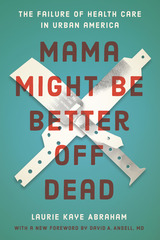
Mama Might Be Better Off Dead immerses readers in the lives of four generations of a poor, African-American family in the neighborhood, who are beset with the devastating illnesses that are all too common in America’s inner-cities. Headed by Jackie Banes, who oversees the care of a diabetic grandmother, a husband on kidney dialysis, an ailing father, and three children, the Banes family contends with countless medical crises. From visits to emergency rooms and dialysis units, to trials with home care, to struggles for Medicaid eligibility, Laurie Kaye Abraham chronicles their access—or more often, lack thereof—to medical care. Told sympathetically but without sentimentality, their story reveals an inadequate health care system that is further undermined by the direct and indirect effects of poverty.
Both disturbing and illuminating, Mama Might Be Better Off Dead is an unsettling, profound look at the human face of health care in America. Published to great acclaim in 1993, the book in this new edition includes an incisive foreword by David Ansell, a physician who worked at Mt. Sinai Hospital, where much of the Banes family’s narrative unfolds.
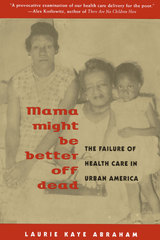
The story takes place in North Lawndale, a neighborhood that lies in the shadows of Chicago's Loop. Although surrounded by some of the city's finest medical facilities, North Lawndale is one of the sickest, most medically underserved communities in the country. Headed by Jackie Banes, who oversees the care of a diabetic grandmother, a husband on kidney dialysis, an ailing father, and three children, the Banes family contends with countless medical crises. From visits to emergency rooms and dialysis units, to trials with home care, to struggles for Medicaid eligibility, Abraham chronicles their access (or lack of access) to medical care.
Told sympathetically but without sentimentality, their story reveals an inadequate health care system that is further undermined by the direct and indirect effects of poverty. When people are poor, they become sick easily. When people are sick, their families quickly become poorer.
Embedded in the family narrative is a lucid analysis of the gaps, inconsistencies, and inequalities the poor face when they seek health care. This book reveals what health care policies crafted in Washington, D. C. or state capitals look like when they hit the street. It shows how Medicaid and Medicare work and don't work, the Catch-22s of hospital financing in the inner city, the racial politics of organ transplants, the failure of childhood immunization programs, the vexed issues of individual responsibility and institutional paternalism. One observer puts it this way: "Show me the poor woman who finds a way to get everything she's entitled to in the system, and I'll show you a woman who could run General Motors."
Abraham deftly weaves these themes together to make a persuasive case for health care reform while unflinchingly presenting the complexities that will make true reform as difficult as it is necessary. Mama Might Be Better Off Dead is a book with the power to change the way health care is understood in America. For those seeking to learn what our current system of health care promises and what it delivers, it offers a place for the debate to begin.

As millions of Americans are aware, health care costs continue to increase rapidly. Much of this increase is due to the development of new life-sustaining drugs and procedures, but part of it is due to the increased monopoly power of physicians, insurance companies, and hospitals, as the health care sector undergoes reorganization and consolidation. There are two tools to limit the growth of monopoly power: government regulation and antitrust policy. In this timely book, Deborah Haas-Wilson argues that enforcement of the antitrust laws is the tool of choice in most cases.
The antitrust laws, when wisely enforced, permit markets to work competitively and therefore efficiently. Competitive markets foster low prices and high quality. Applying antitrust tools wisely, however, is a tricky business, and Haas-Wilson carefully explains how it can be done. Focusing on the economic concepts necessary to the enforcement of the antitrust laws in health care markets, Haas-Wilson provides a useful roadmap for guiding the future of these markets.

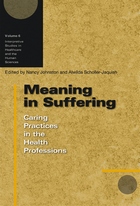

The research in Measuring and Modeling Health Care Costs seeks to connect our knowledge of expenditures with what we are able to measure of results, probing questions of methodology, changes in the pharmaceutical industry, and the shifting landscape of physician practice. The research in this volume investigates, for example, obesity’s effect on health care spending, the effect of generic pharmaceutical releases on the market, and the disparity between disease-based and population-based spending measures. This vast and varied volume applies a range of economic tools to the analysis of health care and health outcomes.
Practical and descriptive, this new volume in the Studies in Income and Wealth series is full of insights relevant to health policy students and specialists alike.

The contributors address conceptual and methodological issues involved in measuring such important health status concepts as: physical, social, and role functioning; psychological distress and well-being; general health perceptions; energy and fatigue; sleep; and pain. The authors present psychometric results and explain how to administer, score, and interpret the measures.
Comprising the work of a number of highly respected scholars in the field of health assessment, Measuring Functioning and Well-Being will be of great interest and value to the growing number of researchers, policymakers, and clinicians concerned with the management and evaluation of health care.
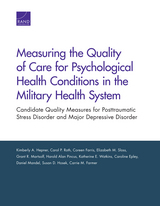

For over thirty years, David F. Kelly has worked with medical practitioners, students, families, and the sick and dying to confront the difficult and often painful issues that concern medical treatment at the end of life. In this short and practical book, Kelly shares his vast experience, providing a rich resource for thinking about life's most painful decisions.
Kelly outlines eight major issues regarding end-of-life care as seen through the lens of the Catholic medical ethics tradition. He looks at the distinction between ordinary and extraordinary means; the difference between killing and allowing to die; criteria of patient competence; what to do in the case of incompetent patients; the meaning and use of advance directives; the morality of hydration and nutrition; physician-assisted suicide and euthanasia; and medical futility. Kelly's analysis is sprinkled with significant legal decisions and, throughout, elaborations on how the Catholic medical ethics tradition—as well as teachings of bishops and popes—understands each issue. He provides a helpful glossary to supplement his introduction to the terminology used by philosophical health care ethics. Included in Kelly's discussion is his lucid description of why the Catholic tradition supports the discontinuation of medical care in the Terry Schiavo case. He also explores John Paul II's controversial papal allocution concerning hydration and nutrition for unconscious patients, arguing that the Catholic tradition does not require feeding the permanently unconscious.
Medical Care at the End of Life addresses the major issues that inform this last stage of caregiving. It offers a critical guide to understanding the medical ethics and relevant legal cases needed for clear thinking when individuals are faced with those crucial decisions.

This volume takes aim at that problem, while taking stock of where we are in our attempts to solve it. Much of this analysis focuses on the capacity to measure the value of technological change and other health care innovations. A key finding suggests that growth in health care spending has coincided with an increase in products and services that together reduce mortality rates and promote additional health gains. Concerns over the apparent increase in unit prices of medical care may thus understate positive impacts on consumer welfare. When appropriately adjusted for such quality improvements, health care prices may actually have fallen. Provocative and compelling, this volume not only clarifies one of the more nebulous issues in health care analysis, but in so doing addresses an area of pressing public policy concern.

Runaway medical costs, long-term care, market competition, for-profit medicine, nursing shortages—these are but a few of the issues that swirl around in the late twentieth century’s volatile health care scene. How much of the system do we want to change, and how much do we want to keep? Health policy expert Eli Ginzberg examines such crucial questions in his characteristically broad-gauged perspective. Framing the issues in their historical, political, and professional contexts, the author analyzes how we have arrived at the current crisis.
The book focuses on the three sides of the medical triangle that have separate and sometimes conflicting goals: the physicians want to provide the most health care for the most money; the government, which furnishes 40 percent of the system's funding, wants to limit the money it pays out for health care; and the public, with over a billion annual visits to doctors, wants the most health care for the least money.
Ginzberg explains how the core components of our health care system—the community hospital and physicians who have long practiced in a fee-for-service mode—are under attack, and he indicates the factors that make it uncertain whether the destabilization will slow down or accelerate. Moreover, can key health care centers maintain their leadership in a time when new dollars for health are scarce? How will the floundering state of foundations affect medical care in local communities?
In his final chapters the author zeroes in on the special concerns of the public: high-need patients (including those suffering from cancer, catastrophic illness, and the infirmities of old age, or those who are mentally ill or chronically poor), nursing shortages, unsuccessful cost containment, and lack of consensus within the medical triangle about the major issues on our nation's health agenda.
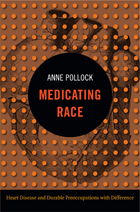
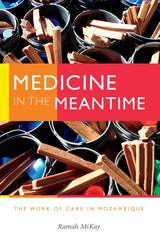
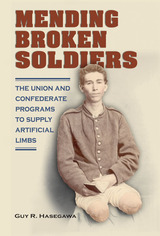
The four years of the Civil War saw bloodshed on a scale unprecedented in the history of the United States. Thousands of soldiers and sailors from both sides who survived the horrors of the war faced hardship for the rest of their lives as amputees. Now Guy R. Hasegawa presents the first volume to explore the wartime provisions made for amputees in need of artificial limbs—programs that, while they revealed stark differences between the resources and capabilities of the North and the South, were the forebears of modern government efforts to assist in the rehabilitation of wounded service members.
Hasegawa draws upon numerous sources of archival information to offer a comprehensive look at the artificial limb industry as a whole, including accounts of the ingenious designs employed by manufacturers and the rapid advancement of medical technology during the Civil War; illustrations and photographs of period prosthetics; and in-depth examinations of the companies that manufactured limbs for soldiers and bid for contracts, including at least one still in existence today. An intriguing account of innovation, determination, humanitarianism, and the devastating toll of battle, Mending Broken Soldiers shares the never-before-told story of the artificial-limb industry of the Civil War and provides a fascinating glimpse into groundbreaking military health programs during the most tumultuous years in American history.
Univeristy Press Books for Public and Secondary Schools 2013 edition
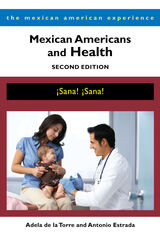
Given recent developments in health care and policy and a steadily increasing population of people of Mexican origin in the United States, a comprehensive look at Mexican American health has never been more necessary. Adela de la Torre and Antonio Estrada first accomplished such an overview with Mexican Americans and Health in 2001, and they have since continued to revise and expand their initial work. With a multitude of additions and renovations, Mexican Americans and Health, 2nd Edition provides a timely and accessible description of current topics in Latino health.
De la Torre and Estrada once again present a broad and nuanced understanding of recent issues involving Mexican American health and well-being, this time with the addition of discussions on:
* the new U.S. Human Development Index to contextualize the health, education, and income status of Mexican Americans relative to other population groups,
* emerging diseases, such as diabetes and obesity,
* recent health-care reforms under the Obama administration,
* substance abuse, sexual risk, and psychological distress among HIV-positive individuals in the gay/bisexual community,
* and predictions of future trends for the next decade.
This new volume has been updated throughout to reflect the many developments in health care since its first edition. Mexican Americans and Health, 2nd Edition continues to present data on a large number of health issues that are important and relevant to the Mexican American population, while describing the social contexts in which they are occurring. Its comprehensive and interdisciplinary approach brings originality and focus to a dynamic literature.
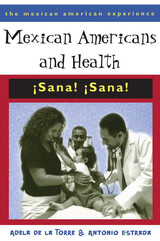
- how values such as machismo, familismo, and marianismo influence care-seeking decisions and treatment of illness;
- how factors such as cultural values, socioeconomic status, peer pressure, and family concerns can contribute to substance abuse;
- how cultural attitudes toward sex can heighten the risk of AIDS—and how approaches to AIDS prevention and education need to reflect core cultural values such as familismo, respeto, and confianza. The book also addresses concerns of Mexican Americans regarding the health care system. These include not only access to care and to health insurance but also the shortage of bilingual and bicultural health care professionals. This coverage stresses not only the importance of linguistic competency but also the need to understand folklore illnesses, herbal remedies, and spiritual practices that can delay the treatment of illness and either complement or compromise treatment. Of all the issues that face the contemporary Mexican American community, none is as important to its very survival as health and health care. This timely book gives readers a broad understanding of these complex issues and points the way toward a healthier future for all people of Mexican origin. Mexican Americans and Health and Chicano Popular Culture are the first volumes in the series The Mexican American Experience, a cluster of modular texts designed to provide greater flexibility in undergraduate education. Each book deals with a single topic concerning the Mexican American population. Instructors can create a semester-length course from any combination of volumes, or may choose to use one or two volumes to complement other texts.
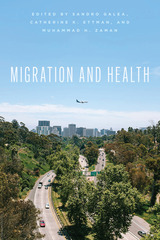
International migrants compose more than three percent of the world’s population, and internal migrants—those migrating within countries—are more than triple that number. Population migration has long been, and remains today, one of the central demographic shifts shaping the world around us. The world’s history—and its health—is shaped and colored by stories of migration patterns, the policies and political events that drive these movements, and narratives of individual migrants.
Migration and Health offers the most expansive framework to date for understanding and reckoning with human migration’s implications for public health and its determinants. It interrogates this complex relationship by considering not only the welfare of migrants, but also that of the source, destination, and ensuing-generation populations. The result is an elevated, interdisciplinary resource for understanding what is known—and the considerable territory of what is not known—at an intersection that promises to grow in importance and influence as the century unfolds.
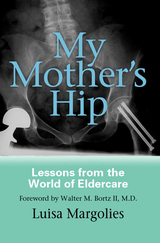
READERS
Browse our collection.
PUBLISHERS
See BiblioVault's publisher services.
STUDENT SERVICES
Files for college accessibility offices.
UChicago Accessibility Resources
home | accessibility | search | about | contact us
BiblioVault ® 2001 - 2024
The University of Chicago Press









